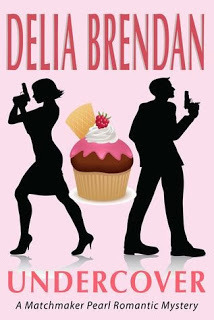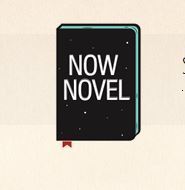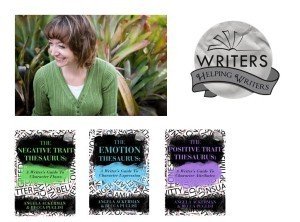Riley Adams's Blog, page 141
January 25, 2014
Twitterific Writing Links
by Elizabeth S. Craig, @elizabethscraig
Twitterific links are fed into the Writer’s Knowledge Base search engine(developed by  writer and software engineer Mike Fleming) which has over 23,000 free articles on writing related topics. It’s the search engine for writers.
writer and software engineer Mike Fleming) which has over 23,000 free articles on writing related topics. It’s the search engine for writers.
Have a great week!
The Two Main Characters – A Writer’s Worksheet: http://dld.bz/dfKNE @amandaonwriting
5 Ways Authors Can Recycle Their Discarded Material: http://ow.ly/sJaFZ @vgrefer
Sing with Your Inner Voice (& Write It All Down). ~ Caroline Brown http://ow.ly/sJaYV @elephantjournal
Fiction writing: When you might want to use passive construction | Into Another World http://ow.ly/sJb3d
Sarcasm in narration: http://dld.bz/dfKK5 @rfwriters
7 Ways to Overcome Writer’s Block: http://dld.bz/dfQta @KenneyMyers
First Be a Storyteller: http://dld.bz/dfKN3 @jamesscottbell
Writers Are People That Stop And Start: http://ow.ly/sJbe6 @thoughtcatalog
Blood-Red Pencil: Audio Editing http://ow.ly/sJbh7 @authorterryo
Foundations of fantasy–Beowulf: http://dld.bz/dfKK9 @RyanHowse
To kickstart inspiration: a plot bank with over 2300 entries: http://dld.bz/dfKKu
Tips for Better Blog Posts for Writers: http://ow.ly/sJbjX @CaballoFrances
When studying your character, don’t think about heroism or gender…think about fear: http://dld.bz/dfKNk @bang2write
Tips for better dialogue: http://dld.bz/dfKMP @rfwriters
Finding your readers online: Award-winning authors speak up: http://dld.bz/dfKJ4 @jimhbs
Writers, we are doing it backwards: http://dld.bz/df8EZ @speechwriterguy
Inspiration and motivation from a slaughterhouse: http://dld.bz/dfV85 @Screenwriter12
Self-Published Authors should always own their own set of ISBNs: http://ow.ly/sL8DA @oceanviewpress
Launch etiquette–must you buy the book? http://dld.bz/dfTUS @KerryGans
Free Research and Development for Authors http://ow.ly/sJbnz @byondpapr
Getting published–a flowchart: http://dld.bz/dfTVb @rfwriters
How Much Can Hybrid Authors Make? http://bit.ly/1eJ1JPJ @steenaholmes
Historical fiction: 10 Rules for Rewriting History http://ow.ly/sJbIw @writerunboxed
An ergonomic tip for writers: http://dld.bz/dfQtt @MartinaABoone
How to use lists to write: http://ow.ly/sJbQc @MSaintGermain
Fantasy Flash Fiction–5 Common Mistakes : http://ow.ly/sJc9c @FaithBoughan
12 Tips To Improve Your Writing In A Hurry: http://ow.ly/sJcfe @AnneWayman
How to Successfully Kill a Character: The Checklist: http://dld.bz/dfTVq @KMWeiland
The Power of Polarizing Through Your Writing: http://dld.bz/dfV8c @menwithpens
Combat in fantasy–10 tips: http://dld.bz/de75M @fantasy_faction
Don’t Start Something New in 2014 (Finish Something Old): http://dld.bz/dfTWC @Jordanrosenfeld
10 tips for writing romance: http://dld.bz/dfTUX @amberrisme
10 Authors Who Wrote for the Silver Screen: http://ow.ly/sJcAk @pastemagazine
18 Signs You’re A Writer At Heart: http://ow.ly/sJcnQ @thoughtcatalog
Should you self-publish? 6 key questions: http://ow.ly/sJcCh @MSaintGermain
Tips on How to Read Your Novel: http://ow.ly/sJcEa @MSaintGermain
5 Things Writing Has Taught 1 Writer About Love: http://ow.ly/sJcki @AlwaysIncluded
How 1 Writer Plans to Write His Best Screenplay Ever: Make His 1st Feature Film: http://ow.ly/sL6Ut @bartondeepwood @nofilmschool
How 1 Writer Plans to Write His Best Screenplay Ever: Make His 1st Feature Film: http://ow.ly/sL6Ut @bartondeepwood @nofilmschool
How 1 Writer Plans to Write His Best Screenplay Ever: Make His 1st Feature Film: http://ow.ly/sL6Ut @bartondeepwood @nofilmschool
Characteristics of the ‘Bad Guy’ Antagonist: http://dld.bz/df8De @rfwriters
How authors can reclaim the rights to their back catalog titles http://ow.ly/sJvOs @Bookbaby
5 Things YA Parents Say (But 1 Writer’s Parents Never Did): http://dld.bz/dfKNv @EmilyCaseysMuse
How to speak publisher: F is for Foreign rights: http://dld.bz/df2dM @annerooney
I have sucked. I currently suck. I will suck. (Or the life of a writer): http://dld.bz/df2d2 @rebeccaberto
Goodreads’ live or die decision to be purchased by Amazon: http://ow.ly/sJw0V @michaelwhite1
Tips for writing something you’ve never experienced: http://dld.bz/df8At @rfwriters
Self editing basics: http://dld.bz/dfDmb @rebeccatdickson
Twitter etiquette: http://bit.ly/1eUlVQZ @jemifraser
Overused Words To Avoid: http://dld.bz/df8AZ @thewritermama
Vulnerable Characters: http://dld.bz/dfG7v @JeanOram
Finding New Readers with a Multi-Author Ebook Bundle: http://bit.ly/1diyxfZ @goblinwriter
The awkward art of book trailers: http://nyr.kr/J8FxEy @rachelarons @pageturner
Plot structure–wow moments: http://bit.ly/1bgfTt1 @camillelaguire
Old methods of reader discoverability–and why they no longer work: http://bit.ly/1mmauVA @kristinerusch
A Beat Sheet For Scrivener: http://bit.ly/1dGCr6V @woodwardkaren
Why Everyone Should Read More Science Fiction: http://huff.to/1bt4Ye3 @huffpost
Putting the Weird in Weird Western: http://dld.bz/dfV8u @gemmafiles @qqwill
Stop being embarrassed about fan fiction: http://bit.ly/1fJRH6d @dailydot
8 tips for better keynote addresses: http://bit.ly/1ceR9Te @paulsloane
How to set writing goals for 2014: http://bit.ly/1gYaVVp @LeahMcClellan
The 10 Biggest Mistakes People Make in Setting Goals: http://bit.ly/1e6pkK1 @michaelhyatt
How to develop your writer’s voice: http://bit.ly/1afAE9Z @writeabook
An agent’s opinion of self-publishing: http://bit.ly/1azH3u4 @Janet_Reid
Thoughts on pacing stories: http://bit.ly/1afBi7p @TiffanyReisz
How to make your romance novel feel real: http://dld.bz/dfDmA @nownovel
Why 1 Writer is Shutting Down His Facebook Page: http://bit.ly/1fJWMve @RobBiesenbach
Learning to Write – a writer’s journey in How To books: http://ow.ly/sL6tS @candygourlay
How to Outwit Second Novel Syndrome: http://dld.bz/df8Fx @Lisa_Alber
5 Ways to Untangle Plot : http://ow.ly/sN69X @Awesome_Dawn
Character Secrets and Contradictions: http://nyti.ms/1azcTnS @nytimes
How To Become A Master Of Creativity – Attitude: http://linkd.in/1dKfAH4 @ConsumGoodsClub
5 Easy Ways To Make Writing A Habit: http://dld.bz/dfDmf @losapala
How Much Does Author Platform Impact Sales? http://bit.ly/1chcM5z @janefriedman
Using Index Cards To Outline A Novel: http://dld.bz/dfDmz @woodwardkaren
Traveling To Research Historical Novels: http://dld.bz/dfDnf @WriteHistNovels
Do Authors Need Publishers? http://bit.ly/1cG1dze @LynneCantwell
Jane Austen on Creative Integrity: http://bit.ly/1dmaZHD @brainpicker
Crowdfunded Anthologies: Concerns For Writers: http://dld.bz/dfG73 @victoriastrauss
Self-Pubbed Books vs. Literary Awards: A Logistical Problem? http://bit.ly/1fJW80H @shaunduke
A play by play of 1 author’s free ebook giveaway: http://bit.ly/19D3CQx @SPressfield
Comparing a scene as written and as shot: http://dld.bz/dfDmt @johnaugust
5 Ways to be a Smart, Gutsy Writer - http://ow.ly/sKTLh @ainegreaney @womenwriters
Do Novelists Need A Book Proposal? http://bit.ly/1jeIW1N @terrywhalin @flawritersconf
Understanding Tolkien: Why His Landscapes Work: http://dld.bz/dfDkW @mharoldpage
Screenwriting site–Loglines R Us: http://bit.ly/1azbI7J @DouglasKing4 @scriptmag
Elements of a good scene–a checklist: http://dld.bz/dfG7j @Writers_Write
8 Screenwriting Clichés to Avoid: http://dld.bz/df9s4 @screencrafting
6 Ways To debunk The Talent Myth: http://ow.ly/sKUl6 @raindance
Creating Active Characters: http://ow.ly/sL8NB @WritersRumpus
Book Pricing (Discoverability) http://ow.ly/sJaAV @kristinerusch
4 Reasons Why Our Entertainment Is Getting More and More Sex Soaked: http://ow.ly/sKYk3 @passivevoiceblg
3 tools that’ll make the submissions process easier for writers: http://dld.bz/dfA97 @chrisrobley
Writers reviewing writers: http://ow.ly/sL98j @hutchingsjulie
How to Kill Your Main Character http://ow.ly/sLbCR @RhiannonPaille @mythicscribes
Is one good Amazon review worse than no reviews? http://ow.ly/sL9xe
7 Mistakes Indie Authors Make with Their Covers: http://ow.ly/sLbCZ @GabrielleSaraP
Will Traditional Publishing Ever Become Author-Focused? | Eric Lorenzen http://ow.ly/sLbD8
Novel endings–don’t rush: http://bit.ly/KgHj7y @lindasclare
Beta readers–the magic elves of the publishing world: http://ow.ly/sLbDc @nzstelter
Lit Fic Mags for Spec Fic Writers: 5 Markets to Consider : http://dld.bz/dfV8g @sfwa
Discoverability–what works: http://ow.ly/sLbDg @alexjcavanaugh
Is the midlist, ‘publishing’s experimental laboratory,’ disappearing? http://ow.ly/sL90K @ZeljkaMarosevic
Why 1 writer is crowdfunding his book: http://dld.bz/dfDmG @johnbiggs
Murder 101: 7 Reasons to Kill your Characters | http://ow.ly/sL9QR @robsmedley86 @fuelyourwriting
Where to Find Beta Readers: http://ow.ly/sLbDq @jamigold
Roadblocks and Why 1 Writer Prefers Blogging to Writing Her Book: http://ow.ly/sLbDt
Yes, Shakespeare used flashbacks and multiple storylines: http://ow.ly/sLbDx @AronsonLinda
On Becoming a (Self) Publisher: (Lessons Learned): http://ow.ly/sKU95 @NickRuffilo @pubperspectives
The Formative Event Technique Raises Your Story’s Stakes: http://bit.ly/1cEIhBh @marilynhorowitz
50 Attributes of a Great Copywriter: http://bit.ly/18C0UtS @jeffbullas
How to Decide Which Story to Write First: http://ow.ly/sN4oW @cantrelljason
Writing Filters to Use: The Finer Details Filters: http://ow.ly/sN3JS @Awesome_Dawn
S Africans slow to adopt e-books: http://ow.ly/sN3Dc @techcentral
3 tips for writing watertight fantasy, science fiction and time travel stories: http://ow.ly/sN3XF @nailyournovel
Another Twist on Marketing your Book http://ow.ly/sN4Yw @CarsonCanada
Can men write good heroines? http://ow.ly/sN4Pt @SamanthaEllis27 @guardianbooks
How to get your indie-book in book stores: http://ow.ly/sN3PY @tamzwrite
A writer’s concerns about using 99 Designs: http://dld.bz/dfDm7 @lkblackburne
10 Writing Tips From Ernest Hemingway: http://ow.ly/sN43z @boyinthehat
Twitter Rewards Spamming Indie Authors with Trending Terms http://ow.ly/sN48o @Goodereadermike @Goodereader
NA Alley: 5 Tips for Writing Love Scenes http://ow.ly/sN3Vy
Why authors and trad pub don’t reveal authors’ earnings http://ow.ly/sN5ar @LexiRevellian
Hard truths about self-publishing: http://ow.ly/sN4w9 @NazareaAndrews
9 Keys to Creating an Effective Writing Accountability Group http://ow.ly/sN4E4 @bigstatebiglife
1 writer’s close-call with a disastrous cover: http://dld.bz/dfKJm @nailyournovel
3 reasons writers should be happy about rejection: http://dld.bz/dfDhF @bookbaby
Avoiding Repetition in Stories: http://dld.bz/dfKJC @shalvatzis
Screenwriters | 10 Ways To Make A Good Impression As A Writer http://ow.ly/sJauP @bang2write
Real Life Diagnostics: Will This Opening Draw in the Reader? http://dld.bz/dfQtg @Janice_hardy
“12 Fundamentals Of Writing The Other”" (And The Self): http://ow.ly/sJajn @djolder”"”
8 Formatting Tips and Shortcuts For Writers: http://dld.bz/dfG7R @joebunting
Online traps for unwary writers and illustrators: http://dld.bz/dfhu9 @nicolamorgan
The Most Likely Person to Read a Book? A College-Educated Black Woman http://ow.ly/sJa4o @pbump
More Americans read books than you think: http://ow.ly/sJa6C @mims
Best practices for social media posting: http://dld.bz/dfrfj @GuyKawasaki
10 Ways to Create Gut-Gnawing Suspense: http://dld.bz/dfG7W @niniehammon
How to Beat the Self-Pub Stigma and Gain New Readers: http://ow.ly/sJacV @Wiseink
Banning the Negative Book Review: http://dld.bz/deY7C & @nytimes
5 Writers Who Took Romantic Revenge in Print | Mental Floss http://ow.ly/sJa07
Can you use social media to increase reader loyalty? http://dld.bz/dfKJb @SMisDynamite
How 1 Writer Plans to Write His Best Screenplay Ever: Make His 1st Feature Film: http://ow.ly/sL6Ut @bartondeepwood @nofilmschool
Can Subscription Services Work for Ebooks? http://ow.ly/sJ9TI @LJSellers
How to improve your writing–subplots and subtext: http://dld.bz/dfhuu @storyfix @writersdigest
All about reader conferences for writers: http://dld.bz/dfG7F @authorterryo
How 1 Writer Plans to Write His Best Screenplay Ever: Make His 1st Feature Film: http://ow.ly/sL6Ut @bartondeepwood @nofilmschool
16 Reasons Why Screenwriters and Film-makers Fail: http://dld.bz/dfG7B @raindance
What’s the Future of Bookstores? 25 Influential Authors Weigh In http://ow.ly/sJ9IF @CarmenConnects
Tips for writing the perfect logline and why it’s as important as your screenplay (or book): http://dld.bz/dfkJs @noamkroll
7 things every writer should be able to do in their sleep. http://ow.ly/sJ9DY @MasqCrew
Is good characterization really about change? http://dld.bz/deY6f @bang2write
Creating Friction With Clashing Personalities: http://dld.bz/dfkKq @thecreativepenn @angelaackerman
The joy of literary destruction: Writers who broke all the rules: http://ow.ly/ @salon
When Reviews Are Negative (Or Worse) http://ow.ly/sJ9uS @rsguthrie
9 Tips on Pinterest for Writers: http://ow.ly/sJ9qF @LPOBryan
More Americans read books than you think: http://ow.ly/sJa6C @mims
Why Writers Should Embrace Household Chores | http://ow.ly/sJ9ku @Writethismoment
Writing novice? 6 best pieces of advice from successful authors: http://ow.ly/sJ96l
More Americans read books than you think: http://ow.ly/sJa6C @mims
5 Writers Who Took Romantic Revenge in Print | Mental Floss http://ow.ly/sJa07
The bad side of Goodreads’ Reading Challenge | Books | theguardian.com http://ow.ly/sJ912 @guardianbooks
5 Writers Who Took Romantic Revenge in Print | Mental Floss http://ow.ly/sJa07
Why Writers Should Embrace Household Chores | http://ow.ly/sJ9ku @Writethismoment
How to Build a Writing Group by Nathaniel Kressen http://ow.ly/sJ8S5 @Janefriedman
Why Writers Should Embrace Household Chores | http://ow.ly/sJ9ku @Writethismoment
Can’t Take a Research Trip? No Problem: http://dld.bz/cUPSz @carrieturansky
How To Make Your Own Free Book Cover In MS Word: http://dld.bz/cU24H @thecreativepenn
How To Fix A Plot That Feels Lightweight Or Predictable: http://dld.bz/cU24U @raindance
The post Twitterific Writing Links appeared first on Elizabeth Spann Craig.
January 23, 2014
Does Mind Mapping Hurt?
by Delia Brendan, @deliabrendan
 Years ago, I went to a plotting workshop. The workshop leader described a process involving white poster board and multi-colored sticky notes. She described how each sticky note color corresponded to various plot elements. At the end of the exercise, she showed the group a completed plot map and explained how this process could help you from getting bogged down during drafting.
Years ago, I went to a plotting workshop. The workshop leader described a process involving white poster board and multi-colored sticky notes. She described how each sticky note color corresponded to various plot elements. At the end of the exercise, she showed the group a completed plot map and explained how this process could help you from getting bogged down during drafting.
As a visual person, I loved the concept of working from a map. So, I dutifully went out and bought white poster board and enough sticky notes to outfit a corporation. As an organizationally-challenged over thinker, I was soon mired down in details. Was Dr. Venom’s mother from Siberia a blue sticky note because she was related to a bad guy or a green sticky note because she befriends the heroine? No surprise, I never wound up with a plot map and I’m still pulling sticky notes out of sock drawers and couch cushions.
If I could get my information organized in virtual notebooks, was a free tool that would help me organize my plot too much to hope for?
It turns out it’s not. Now, when I say “mind mapping,” I need you to take a deep breath. It’s a terrible name as it conjures images of being strapped in a chair as electrodes are attached to your temples. It’s not something that one might think would help creativity, but it is invaluable.
“Mind mapping” is not new. It’s just a description of how to organize your thoughts. In terms of the software, a map is nothing more than that huge piece of white poster board we lugged home from the office supply store. Topics and subtopics are the sticky notes.
Let’s look at this in action with the story of Sleeping Beauty. As you dig back in your Disney brain, recall that the story opens with the birth of the King and Queen’s daughter. An evil fairy casts a spell on the child that when a spindle pricks her she’ll die. A good fairy can’t remove the curse, but she alters it. Instead of dying, the princess will fall into a 100-year sleep and be awoken by the kiss of a prince. Fifteen years later, the princess accidentally triggers the curse.

The name of the story is our starting points, my first two topics are the key events: the curse and triggering the curse.
The activities that follow each of those events are subtopics. There’s no right or wrong way to create a map. You start from the point that makes sense to you.
Depending on the software, you can customize the map. If you enjoyed the sticky notes colors, rest assured you can color your topics. Even better, you can change Dr. Venom’s mother from a blue to a green without having to find where you put the green sticky notes. Topics can be rearranged by clicking and dragging. You can also order items across branches with markers or create relationships as you build a chapter structure.
When I was writing the first Matchmaker Pearl romantic mystery, Undercover (2013), I appreciated the ability to open and close branches on the map until I needed them. It helped avoid being overwhelmed by an intricate and complex plot structure.
So, what application should you use? The answer is the one you like. What makes complete sense for me may not for you. You’ll need to try a couple to find the best fit.
Here are a few products to get you started:
XMind—(Windows/Mac) Xmind is very popular. I was amazed at how came in the free version. It’s an application, so you need to spend a few minutes to understand how it works. It is very right-click oriented as you add topics and subtopics.
MindJet Maps—(Windows/Mac/iPad) MindJet is aimed at a professional audience and the computer version price reflects that. However, I discovered that the iPad version is free. That is great news because the iPad app is terrific. It has a streamlined interface, easy to understand, and the tutorial is very helpful without being invasive. You can either save maps to defined storage areas, like Dropbox or Box.com, or email them as PDFs or mind map files.
Coogle—(Web) Coogle is a basic free web application. You can sign in with either Google or Facebook credentials. It has a very clean web interface and can handle basic mapping. This is may be a good place to start, but I’m concerned that this product may be too limited if you have a complex plot.
Before diving in, I have two pieces of advice. First, whenever you’re downloading software make sure to take a few minutes and look at the licensing agreement. It’s not breathtaking reading, but it’s important to understand the parameters and what they do with your data. Second, spend a few minutes with the tutorials. Each product has it’s own nuances and this will save you time.
 Delia Brendan was born and raised in Washington state. She graduated from the University of Southern Mississippi with the kind of doctorate that you don’t want when you’re bleeding or trying to determine if that lump “means something.” Her careers have always involved writing, be it technical writing, legal writing, or just your average system down messages.
Delia Brendan was born and raised in Washington state. She graduated from the University of Southern Mississippi with the kind of doctorate that you don’t want when you’re bleeding or trying to determine if that lump “means something.” Her careers have always involved writing, be it technical writing, legal writing, or just your average system down messages.
A chance meeting of Pearl Waterman in 2012 brought a desire to share her adventures and explain what really happens in Dandelion. She is married to writer Sean Brendan Brown and they live in Olympia with a very gray, fat little beagle named Katie.
The post Does Mind Mapping Hurt? appeared first on Elizabeth Spann Craig.
January 21, 2014
Reasons and Methods of Killing Characters—And One Reason Not To
By Elizabeth S. Craig, @elizabethscraig
There’s an interesting phenomenon when you comb through your RSS reader—even if you have a large number of blogs that you’re following. Sometimes it’s as if everyone got an idea for a particular blog post at the same time. This is natural when you’re talking about posts on a topical issue (publishing news) but a little eerie when it happens spontaneously, with nothing prompting it.
So I recently came across and shared or scheduled for sharing, four different posts in a week’s time, that either linked to material on the same topic, or posted on that topic. So we’ve got “400+ Ways to Kill a Character” from Clever Girl Helps, “How to Successfully Kill a Character—the Checklist” from K.M. Weiland, “How to Kill Your Main Character” from Rhiannon Paille, and “Murder 101—7 Reasons to Kill Your Character” from Robert Smedley.
I was blinking from all the killing, and I’m a murder mystery writer.
All of the posts had excellent points, which is why I shared them. K.M. Weiland also delves into reasons why you shouldn’t kill a character:
Shocking readers just for the sake of shocking them. (Shock value isn’t without its, well, value, but not every author is Alfred Hitchcock and not every story is Psycho.)
Making readers sad just for the sake of making them sad. (An old saw says, “If they cry, they buy.” But readers never appreciate being tortured without good reason.)
Removing an extraneous character. (I know, I know. I just said that was a good reason. But you have to double-check this one. If the character is extraneous, then you better verify he really belongs in this story in the first place.)
Naturally, as a mystery writer, I kill characters all the time. I’ve done the math. At a rate of two bodies a book and I’m on my fourteenth book…that’s 28 bodies I’ve got littered out there. But my readers expect bodies in these books. They even enjoy trying to figure out who body number two is (body number one is always disclosed on the back cover). I write a gentler subgenre, so my victims are usually the result of blunt force trauma, falls, or barely-described poisonings, knifings, or gunshot wounds. Although the 400+ ways of killing characters post was fascinating to me.
But what series readers don’t usually expect is for main characters in the series to die. They’ve developed relationships with the recurring cast members and I haven’t broken that covenant with them…yet. Although our discussion the other day of dark story arcs for series made me mull this over a bit.
But there is one element I think we have to consider—what have we either invested in this character in the past or what potential does this character have to be a good investment for our series? Basically: does this character have star quality?
I have an example, actually. I’ve mentioned before that I have an editor who likes outlines and I turn in an outline for each book in the series before writing it. I’d submitted this particular outline (this was probably 3 years or so ago) and she said she loved it—but she really wanted to keep Miss Sissy. In fact she’d particularly liked Miss Sissy the best among the supporting characters.
Miss Sissy, of course, died in the book’s second act—in the outline. But that’s the nice thing about outlines…they can be changed. So I brought Miss Sissy back from the dead and picked another victim. And the editor made a great call—Miss Sissy ended up being the character I hear most about when I get reader emails for that series.
So, my basic point is—if you’ve got a character with potential for reader popularity, you might want to back off from killing that one. If it’s a series. Just saying. It’s hard enough to create new, lifelike characters for a series…why put in all that labor, create a solid, winning character, and then kill her off for the sake of a minor plot twist? Then we’re back at the drawing board for the next book in the series, trying to create another well-rounded, lifelike character that readers relate to. Now obviously, if a major plot point or story arc depends on the death of a character…this is just something we have to go through with, regardless.
How can we know which characters instantly resonate with readers? If you don’t have an editor…it may help to get one (I maintain a free database that has many freelance editors listed). Otherwise, beta readers are also very helpful—good betas are discerning and honest readers who can provide you with constructive feedback. There have also, in another feat of synchronicity, been a couple of solid recent posts on betas: “Beta Readers: The Magic Elves of the Publishing World” by Nillu Nasser Stelter and “Where to Find Beta Readers” by Jami Gold.
Have you ever killed a main character? How and why did you do it? When might you avoid killing off one?
Image: MorgueFile: Penywise
The post Reasons and Methods of Killing Characters—And One Reason Not To appeared first on Elizabeth Spann Craig.
January 19, 2014
3 Common Reasons We May Not Feel Motivated to Write
by Bridget McNulty , @nownovel
 No matter how badly you want to write, you may find yourself feeling unmotivated. However, by figuring out why you are unmotivated, you can overcome that inertia and get back to putting words down on paper regularly.
No matter how badly you want to write, you may find yourself feeling unmotivated. However, by figuring out why you are unmotivated, you can overcome that inertia and get back to putting words down on paper regularly.
One of the most common reasons you may be unmotivated is due to fear. Fear might be telling you that your writing will never be good enough. Fear might be suggesting that you compare your first drafts to the published output of longtime professional writers and wonder why you are not magically producing work that is just as good on the first try. There are a few ways to manage this fear. One way is simply to realize that most first drafts are not very good and that no one starts out as a brilliant writer. One psychological trick involves giving your worries and negative thoughts space and a time limit. Five minutes to vent about all your worst fears may be all that is needed. Finally, keep in mind that most writers are not fearless either, but they keep writing in the face of that fear.
Being too busy can leave you unmotivated as well, and many people do have genuinely busy lives between jobs, volunteer work and taking care of family. If you find that having too much to do is leaving you unmotivated to write, you have a few options. Can you cut any activities from your schedule? Perhaps you can get take-out a couple of nights per week or persuade a family member to take over cooking duties. Another option is to get up half an hour earlier or stay up half an hour later at night. Early mornings before anyone else is awake can be best. Finally, you can look for spaces in the day where you might have time to write including breaks at work, lunch breaks, commutes or even while waiting in line.
Unfortunately, being busy can also mean being tired, and this can be another impediment to writing motivation. It’s hard to be creative when you are exhausted. As with being too busy, try to cut out an activity. If this isn’t possible, look at your nutrition and even your exercise. Eating better and getting a little exercise can give you the energy boost you need.
What are some things that interfere with your writing motivation, and how do you defeat them in order to get that motivation back?
Bridget McNulty is the founder of Now Novel. Now Novel is an easy to use online novel writing course with a helpful creative writing blog .You can find Now Novel on Twitter @nownovel
The post 3 Common Reasons We May Not Feel Motivated to Write appeared first on Elizabeth Spann Craig.
January 18, 2014
Twitterific Writing Links
by Elizabeth S. Craig, @elizabethscraig
Twitterific links are fed into the Writer’s Knowledge Base search engine(developed by writer and software engineer Mike Fleming) which has over 23,000 free articles on writing related topics. It’s the search engine for writers.
Have a great week!
A free directory of cover designers, formatters, freelance editors, and more: http://bit.ly/nolbXq
How Morals and Basic Needs Influence a Character’s Positive Traits: http://dld.bz/dfFAQ @BeccaPuglisi
Tips for querying a self-pubbed novel: http://dld.bz/dftSX @Janet_Reid
99 clichés in epic fantasy: http://dld.bz/dftTx
3 Ways to Write Great Supporting Characters: http://dld.bz/dftTW
Do writers need a website? http://dld.bz/dfwKA
How Much Money Is In the Self-Publishing Game? http://dld.bz/dfwKM @jamesscottbell
7 Steps To Road Testing Your Concept: http://dld.bz/dfwKV @bang2write
The 10 Rules of Surveillance Dystopia Stories: http://dld.bz/dfwKY @io9
Teaching writing: shared writing: http://dld.bz/dfwNU @BethMooreTCRWP
A Look at Pacing and Tension on the Opening Page: http://dld.bz/dfwPb @Janice_Hardy
Building a Multi-Layer Table of Contents in MS Word: http://dld.bz/dfwPq
Freelancers–How to Boost Your Sagging Motivation for Writing: http://dld.bz/dfxuT @ticewrites
When Writers Receive Conflicting Advice: http://dld.bz/dfx3v
Rewriting–a checklist for authors: http://dld.bz/dfx5n @Writers_Write
World building–maps: http://dld.bz/dfx5C @rfwriters
A secret to writing the dreaded synopsis: http://dld.bz/dfx5W @annerallen
Tips for Writing Your Novel Like a Song: http://dld.bz/df2da @jawardwrites
I have sucked. I currently suck. I will suck. (Or the life of a writer): http://dld.bz/df2d2 @rebeccaberto
16 ways to get jazzed up about writing again: http://dld.bz/df2d4 @LauraPepWu
Burn Bright and Be Patient: http://dld.bz/df2dF @susankayequinn
How to speak publisher: F is for Foreign rights: http://dld.bz/df2dM @annerooney
10 tips to grow your email list: http://dld.bz/df2eb @jeffbullas
Screenwriting: Classic 80s Movie: “Working Girl”: http://dld.bz/df2eh @gointothestory
The Dutch-Elm Disease of Creative Minds: http://dld.bz/df4ZC @mrkocnnll
The Main Character in Their Own Lives: Does Diversity Make YA SF/F Better? http://dld.bz/df5ah @tansyrr @tordotcom
Does a Blog With Multiple Contributing Authors Dilute Your “Brand?” http://dld.bz/df5a5 @Jenpens2
The Duality of Character Traits–Why We Need the Good, the Bad and Even the Ugly: http://dld.bz/df5a7 @kristenlambtx @BeccaPuglisi
How to make action sequences pop: http://dld.bz/df5aY
Your story’s hero needs to take action: http://dld.bz/df5bm @storyfix
Break the Rules for Style: http://dld.bz/df5bs @Jen_328 @WriteDivas
7 things most writers fear: http://dld.bz/df5bB @SylviaNey
A mantra for writers–do the work: http://dld.bz/df8Ag @NinaBadzin
Tips for writing something you’ve never experienced: http://dld.bz/df8At @rfwriters
Don’t Be Too Quick To Shut Down That Author Blog: http://dld.bz/df8A2 @indieauthor
How to write faster: http://dld.bz/df8AM @goodinaroom
Overused Words To Avoid: http://dld.bz/df8AZ @thewritermama
The Beginner’s Guide to Planning and Writing a Memoir: http://dld.bz/df8Bj @thewritelife
20 + Free Resources to Create a Simple Ebook: http://dld.bz/de3y5 @lifehackorg
Characteristics of the “Bad Guy” Antagonist: http://dld.bz/df8De @rfwriters
Will Your Novel Be a Best Seller? Ask An Algorithm: http://dld.bz/df8DM @gizmodo
7 Simple Edits That Make Your Writing More Powerful: http://dld.bz/df8DX @jonmorrow
Writers, we are doing it backwards: http://dld.bz/df8EZ @speechwriterguy
A trad.published author’s apology to self-pubbed authors: http://dld.bz/df8Fq @nataliewhipple
How to Outwit Second Novel Syndrome: http://dld.bz/df8Fx @Lisa_Alber
Who cares what others will think? Write the story you want to write: http://dld.bz/df8F6 @BadRedheadMedia
35 Perfect Examples of the Art of the Short Story: http://dld.bz/df8F7 @flavorwire
14 Great Books About To Become Movies: http://dld.bz/df8FA @cinemablend
Creativity In The Face Of Depression: http://dld.bz/df8Gr @HutchingsJulie
50 better ways to say “looks/seems like”: http://dld.bz/df8G5
Smashwords’ Mark Coker: Authors Should Focus on Quality Writing: http://dld.bz/df9mU @STTBooks
How to Save Local Bookstores in 2 Easy Steps: http://dld.bz/df9mW @SnarkyNomad
Why Writers Write About Writing: http://dld.bz/df9na @briaeliza
10 Tips on Self-Publishing: http://dld.bz/df9nf
20 Accounts All Screenwriters Should Follow on Instagram: http://dld.bz/df9qB @screencrafting
How Readers Can Find Your Book: http://dld.bz/df9qX @111publishing
Cash vs. Cache: Why Self-Publishing Pays Better: http://dld.bz/df9rh @contently
6 Best WordPress Plugins for Amazon Associates: http://dld.bz/df9rq
Tips for publishing and marketing your ebook on Amazon: http://dld.bz/df9ry @ProLifeMastery
Writers and rum: http://dld.bz/df9rz @NewYorker @adamgopnik
2014: Increased Competition Between Traditional Publishers and Indie Authors: http://dld.bz/df9rC @passivevoiceblg
1 midlist writer’s 2013 income: http://dld.bz/df9rH @jimchines
Option clauses in book contracts: http://dld.bz/df9rS @busyguru
4 things a good query does: http://dld.bz/df9sb @KourHei
8 Screenwriting Clichés to Avoid: http://dld.bz/df9s4 @screencrafting
The Role of the Rights Department in Publishing: http://dld.bz/df9sE @tordotcom
The Long Tradition of Hating Your Own Work: http://dld.bz/dfA9p @99u
Where Do Character Strengths Come From? http://dld.bz/dfA9t @beccapuglisi
Lessons in character development: parental influences: http://dld.bz/dfA9w @onewildword
The Amateur’s Guide to a Professional Book Package: http://dld.bz/dfA92 @diymfa @melindavan
3 tools that’ll make the submissions process easier for writers: http://dld.bz/dfA97 @chrisrobley
Lit Fic Mags for Spec Fic Writers: Is it Literary? http://dld.bz/dfA9B @sfwa @spitkitten
How to Make a Fantasy World Map: http://dld.bz/dfAAr @tordotcom
Script To Screen: “Wag the Dog”: http://dld.bz/dfABT @gointothestory
Tips for writing your novel faster: http://dld.bz/dfABV @EmilyBenet
Editors Respond Far Better to Positive: http://dld.bz/dfACa @behlerpublish
12 Ways To Be More Focused And Get More Things Done Quickly: http://dld.bz/dfACd @Higher_Boy
On Letting Your Characters Go: http://dld.bz/dfACe @ava_jae
3 Ways the Magic of Dr. Seuss Can Help You Create Unforgettable Copy: http://dld.bz/dfACn @copyblogger
5 writing and reading myths debunked (sort of): http://dld.bz/dfACK @BookPassTime
How to write your book’s first draft like a professional: http://dld.bz/dfDgU @bookbaby
Special Needs in Strange Worlds: Quick Fixes Usually Aren’t: http://dld.bz/dfDha @sfsignal
10 Authors and Publishers to Follow on Instagram: http://dld.bz/dfDhf @heidenkind @bookriot
It’s OK to hate your book: http://dld.bz/dfDhg @johnhartness
Writing vs. publishing (or: “No more half-measures, Walter”): http://dld.bz/dfDhC @chuckwendig
3 reasons writers should be happy about rejection: http://dld.bz/dfDhF @bookbaby
Understanding Tolkien: Why His Landscapes Work: http://dld.bz/dfDkW @mharoldpage
Self editing basics: http://dld.bz/dfDmb @rebeccatdickson
5 Easy Ways To Make Writing A Habit: http://dld.bz/dfDmf @losapala
Comparing a scene as written and as shot: http://dld.bz/dfDmt @johnaugust
Using Index Cards To Outline A Novel: http://dld.bz/dfDmz @woodwardkaren
A writer’s concerns about using 99 Designs: http://dld.bz/dfDm7 @lkblackburne
How Morals and Basic Needs Influence a Character’s Positive Traits: http://dld.bz/dfFAQ @BeccaPuglisi
Book Contests for Indie Authors: http://dld.bz/dfGGJ @JodieRennerEd
Plans to improve the BEA con: http://dld.bz/dfWCf @Porter_Anderson @StevenRosato ##BEA14
The post Twitterific Writing Links appeared first on Elizabeth Spann Craig.
January 16, 2014
Writing Books Faster—Without Compromising Quality
By Elizabeth S. Craig, @elizabethscraig
These days, it seems as though everyone is talking about writing faster. And there’s definitely a link between the number of books we have available for sale and sales rank…if our books are good.
But that’s the problem. How do we ensure quality while turning out books as fast as we can?
I could write more or faster than I do now. But I don’t want to risk compromising my writing.
Instead, I’ve worked on ways to streamline and fine-tune my process to make the most of the writing time I have. And I’ve become more organized to provide more opportunities to write.
Here are the four big ways I’ve gotten more done with the time that I’ve got (and added a few more minutes, to boot):
1: By using a mini-outline. A mini-outline, as I’ve mentioned before, is useful for a couple of different reasons. One, it keeps me from having to re-read what I wrote the day before, which is time-consuming—I always end writing sessions with a short sentences explaining where I left off. For another, they succinctly tell me what I plan to write that day so I’m not trying to figure out the direction of my story. I keep these brief and specific and designed for that day’s writing.
2: Thinking about my story before opening up the laptop (priming the pump). I write first thing in the morning, so I start thinking about my writing plan as I’m getting up, pouring my coffee, and letting the dog out. It prevents those minutes of staring blankly at a computer screen and helps me get my thoughts in order and get in the writing mode.
3: Outlining the next story in a series when finishing up a book in the same series (described in this post). This is for everyone who writes multiple series…it’s a real time saver. Outline the next story in the series as soon as you finish a book in the series and before making the leap to writing a different series.
4: Making my non-writing life more streamlined. Finding other ways to cut corners during my day. Hello, crockpot. (A few recipes that are pretty steadily in my rotation with the slow cooker: potato soup, hamburgers, creamy chicken, and easy shredded chicken). Instead of having to run last minute errands, I put everything I need to do each day on my Google calendar—and set Google to email me each morning at 5 a.m. with a daily agenda. Using a free timer to help me keep track of the time I spend online checking email or Twitter.
5: Making the most of spare time by using it to write. Even the unexpected bits of small time that accumulate in a day. I use lists to help me make progress on my manuscript when I get an extra 5-15 minutes. I upload my manuscript to Google Drive or SkyDrive to make sure I have my book with me at all times (this also functions well as a backup, since it’s on a cloud).
Are you trying to increase output without sacrificing quality? How are you going about it?
The post Writing Books Faster—Without Compromising Quality appeared first on Elizabeth Spann Craig.
January 15, 2014
Best Practices for Self-Publishers
by Elizabeth S. Craig, @elizabethscraig
Today I’m guest-posting at the Insecure Writer’s Support Group blog with seven best practices for self-publishing success.
The Insecure Writer’s Support Group was founded by writer Alex J. Cavanaugh to support and encourage writers and to provide resources for everything from the writing craft to marketing a book.
Hope you’ll pop over and visit.
The post Best Practices for Self-Publishers appeared first on Elizabeth Spann Craig.
January 12, 2014
How Morals and Basic Needs Influence a Character’s Positive Traits
by Becca Puglisi, @BeccaPuglisi
Since Angela Ackerman and I wrote our last book, The Positive Trait Thesaurus: A Writer’s Guide to Character Attributes, I’ve been thinking a lot about personality traits and how they’re formed. Flaws are incredibly important for a character to have—and, let’s be honest: they’re really interesting to read about. But one of the main reasons we fall in love with characters is because we want them to succeed, to achieve their goals and overcome their flaws; this is where the positive attributes come in. The fact is, every character needs both positive and negative traits, and these traits need to be chosen thoughtfully.
When it’s time to create your character and figure out what his traits will be, you should take into account many factors that influence their development: genetics, upbringing and caregivers, past wounds, environment, peers—all of these things absolutely cause certain traits to organically emerge for a character. (For more information on how these factors influence trait development, please see this post on the topic.) Today, I’d like to zero in on what I believe are the two biggest influencers on trait formation: morality and basic needs.
Morality
Every character—protagonist, villain, sidekick, mentor, etc.—lives by a moral code. His beliefs about right and wrong are deeply embedded in his psyche and will influence his decisions, day-to-day actions, the way he treats people, how he spends his free time—they will impact every area of his life, including his personality. A character will only embrace traits that in some way align with his moral beliefs. Because of this, it’s crucial that we know what our characters believe and value in order to figure out which qualities will define him.
Take, for example, Zack Mayo from An Officer and a Gentleman. Mayo’s morality is largely derived from a traumatic childhood event: finding his mother’s body after she killed herself. Mayo’s father took him in but made it clear that taking responsibility for an impressionable boy wasn’t going to put a crimp in his affinity for drugs and prostitutes.
Fast forward a decade, and Mayo’s moral code has been formed from this sad crucible: look out for yourself because no one else will. Many of his defining traits stem directly from this belief. He’s independent, opportunistic, persistent, apathetic, emotionally withdrawn, and selfish. It would have made no sense for someone with Mayo’s moral code to embrace selflessness or loyalty, because to embody these traits, he’d have to go against his most important belief.
This is why its crucial to know your character’s backstory. All those factors I mentioned earlier? Put those puzzle pieces together to figure out what your character now values, what he believes about right and wrong. Once you know his moral code, you’ll know which traits he’ll embody and which ones he’ll disdain. His defining traits will be pretty much fixed because to reject them, he’d have to reject what he most believes in.
Basic Needs
But sometimes, as authors, a drastic shift in morality is exactly what we want for our characters. This kind of change doesn’t occur easily, but it can happen under the right circumstances. This is where basic needs come into play.
According to psychologist Abraham Maslow, individuals are driven by needs that fall into five categories:
Physiological: the need to secure one’s biological and physiological needs
Safety and Security: the need to keep oneself and one’s loved ones safe
Love and Belonging: the need to form meaningful connections with others
Esteem and Recognition: the need to increase one’s sense of esteem
Self-Actualization: the need to realize one’s full potential and achieve personal fulfillment
The first level is the most important; if a character’s physiological need isn’t being met, he’ll do whatever it takes to meet that need. Once it’s met, the next level becomes the most crucial. And so on.
If you’re crafting a story and you discover that you need one of your characters to undergo a major moral shift, simply take away one of his basic needs. An awesome example of this is the movie Prisoners. Hugh Jackman’s character is a responsible citizen — morally upright and a family man. But then his daughter goes missing (i.e., his need for safety and security is no longer being met). He’s certain he knows who abducted her, but the police won’t do anything about it. He tries everything he can think of to get his daughter back while working within the confines of his moral beliefs. When those ideas run out, he begins wrestling with the options that don’t coincide with his moral code. Desperate to regain his former equilibrium where all of his needs were being met, his morality shifts. He abducts his daughter’s suspected kidnapper and tortures him in an effort to learn of her whereabouts. His basic belief that all human beings are deserving of dignity and respect has changed—and so have his traits. Respect has turned to cruelty. Centeredness gives way to fanaticism. And all of this can be traced back to one need that is no longer being met.
We’re cruel taskmasters, we authors. But it’s through difficulty that true character emerges, and if we want our protagonists to grow, we have to provide growth opportunities. Know your character’s moral code and choose suitable traits. If you need your character to make a big change, threaten one of his basic needs. Then sit back and watch the metamorphosis begin.
Thank you, Elizabeth, for inviting me to post at your blog today. As a special thanks for the warm welcome, I’d like to give away a PDF copy of my book, The Positive Trait Thesaurus: A Writer’s Guide to Character Attributes. Just leave a comment to enter for a chance to win. The giveaway runs through January 14th, after which time I’ll pick a winner. Best of luck!
Becca Puglisi is the co-creator of The Bookshelf Muse, an award winning online resource for writers. She has also authored a number of nonfiction resource books for writers, including The Emotion Thesaurus: A Writer’s Guide to Character Emotion; The Positive Trait Thesaurus: A Writer’s Guide to Character Attributes; and The Negative Trait Thesaurus: A Writer’s Guide to Character Flaws. A member of SCBWI, she leads workshops at regional conferences, teaches webinars through WANA International, and can be found online at her Writers Helping Writers website.

The post How Morals and Basic Needs Influence a Character’s Positive Traits appeared first on Elizabeth Spann Craig.
January 11, 2014
Twitterific Writing Links
by Elizabeth S. Craig, @elizabethscraig
Twitterific links are fed into the Writer’s Knowledge Base search engine(developed by writer and software engineer Mike Fleming) which has over 23,000 free articles on writing related topics. It’s the search engine for writers.
Have a great week!
Crafting an effective opening: http://dld.bz/deSwa
10 Commandments for Interview Sources: http://dld.bz/deSwe @urbanmusewriter
12 Reasons Why Breaking Bad Would’ve Made An Incredible Novel: http://dld.bz/deSwk @LukeLeeOfficial
Writing a confession without cliché: http://dld.bz/deSyv
25 Websites To Click If You Are In Publishing: http://dld.bz/deSyy
How to keep rejection letters in perspective: http://dld.bz/deApn @KarenCV
Why 1 writer has chosen self-pub (which he calls ‘team pub’): http://dld.bz/cQDNy @daniel_baylis
Why Writers Must Self-Publish Their Books: http://dld.bz/deY53 @jfbookman
Writing About Emotions… or Why You Have to Go Through Stuff: http://dld.bz/deY5B @kathleenpopa
7 Mistakes Authors Make Online: http://dld.bz/deY5Q @EdieMelson
Advantages of e-readers for older adults: http://dld.bz/deY5R @annerallen
10 Common Elements Of Award Winning Screenplays: http://dld.bz/deY5U @elliot_grove
How Writing a Book Proposal Can Boost Your Sales: http://dld.bz/deY5Y @flawritersconf @AllyMachate
Is Blogging Really Necessary? http://dld.bz/deY6c @writerplatform
3 Rules of Character: http://dld.bz/deY6d @shalvatzis
Is good characterization really about change? http://dld.bz/deY6f @bang2write
How to write down story ideas so you can remember why they were brilliant: http://dld.bz/deY6m @nailyournovel
1 writer’s note to her pre-published self: http://dld.bz/deY63 @deborahcoonts
Author brands – Why Consistency is Worth Paying For: http://dld.bz/deY6A @ollyrhodes @RomanceUni
Resolving the Amazon Keyword Issue: http://dld.bz/deY7m @bookgal
Banning the Negative Book Review: http://dld.bz/deY7C& @nytimes
Do you find your genre, or does it find you? http://dld.bz/deY7K @ventgalleries
How to Turn Down or Leave a Freelance Writing Gig Tactfully: http://dld.bz/deY7N @freelancewj
Character motivation sheet: http://dld.bz/deY7Q @yahighway
7 steps to a great WordPress author website: http://dld.bz/deY7T @ollyrhodes
63 Character Emotions to Explore: http://dld.bz/cMCTj @fictionnotes
The search engine for writers: writerskb.com @hiveword
The search engine for writers: writerskb.com @hiveword
How To Create Distinct Characters: An Exercise: http://dld.bz/dfcM2 @woodwardkaren
To name, or not to name? An unusual case involving oppression: http://dld.bz/deMvu @juliettewade
Writing (Not Overwriting) Description: http://dld.bz/dfht6 @scriptmag
How to Stay Focused & Motivated to Get Your Book Done: http://dld.bz/dfhtQ @FutureofInk
10 Google Chrome Extensions That Save Time And Keep You Organized: http://dld.bz/dfhtT @RWW
1 writer’s Wattpad experience: http://dld.bz/dfhuc @TheWritPlatform
How to improve your writing–subplots and subtext: http://dld.bz/dfhuu @storyfix @writersdigest
Online traps for unwary writers and illustrators: http://dld.bz/dfhu9 @nicolamorgan
Freelancers: Free Bookkeeping with Nutcache: Track Your Expenses and Get Paid: http://dld.bz/dfhuM @tutsplus
The Top 5 Characteristics of a Great Villain: http://dld.bz/dfhvt @RebeccaZanetti
A 5-Step Strategy for Building a Successful Blog: http://dld.bz/dfhv8 @tglong
Do you need a literary agent? http://dld.bz/dfhwx
What Makes You So Special? The Magic to Selling Books: http://dld.bz/dfhw2 @kristenlambtx
5 tools for building conflict in your novel: http://dld.bz/dfhwH @JamesScottBell @writersdigest
7 ways to add subplots to your novel: http://dld.bz/dfhxA @writersdigest @BrianKlems
How to Master Your Creative Writing Process: http://dld.bz/dfkD5 @WritingForward
6 tips for protecting your images on social networks: http://dld.bz/dfkEj @JessieNuez.
Imaginary Audience: 6 Tips on Envisioning Your Readership: http://dld.bz/dfkEs @_RobbieBlair_
4 Branding Tips for Nonfiction Writers and Authors: http://dld.bz/dfkEu @NinaAmir
How to write a book to film adaptation simultaneously: http://dld.bz/dfkGs @orbitbooks
George R. R. Martin: “There Are 2 Kinds of Writers: Architects and Gardeners”: http://dld.bz/dfkG4 @99u
Tolkien Explains Why There’s No Such Thing as Writing “For Children”: http://dld.bz/dfkHb @brainpicker
Tips for writing the perfect logline and why it’s as important as your screenplay (or book): http://dld.bz/dfkJs @noamkroll
78 free, legal movie script PDF downloads: http://dld.bz/dfkJJ @gointothestory
Creating Friction With Clashing Personalities: http://dld.bz/dfkKq @thecreativepenn @angelaackerman
5 Things Novelists Can Learn From Screenwriters: http://dld.bz/dfkK2 @WritersRelief
10 self-pub tips from a bestselling author: http://dld.bz/dfkKG @spalding_author
Tips for setting up book signings as a self-pubbed writer: http://dld.bz/dfkKK
8 of the Best Genre-Busting Books About Writers and Writing: http://dld.bz/dfkKP @flavorwire
Running into set-backs as a writer? Focus on moving forward: http://dld.bz/dfkKU @hopeclark
The Exotic & Erotic Truth about Women Writers: http://dld.bz/dfkKV @francescabiller @elephantjournal
How to Plan Your 2014 Screenwriting Goals: http://dld.bz/dfkKX @CConradt
7 Biggest Threats to Writing: http://dld.bz/dfp5A @Lyndaryoung
Using Story Beats To Increase Writing Speed: http://dld.bz/dfp5P @DavidGaughran
What’s wrong with (some) modern fantasy: http://dld.bz/dfp6a @mharoldpage
4 truths to help you succeed as a self-pub writer: http://dld.bz/dfp6d
Script writing resources: http://dld.bz/dfp6m @rfwriters
7 Tips to Design an Effective Author Newsletter: http://dld.bz/dfqXb @sierragodfrey
3 Writing Tips Learned From NaNoWriMo: http://dld.bz/dfqXd @Janice_hardy
6 Benefits of Self-Publishing: http://dld.bz/dfrau @WritersEdit
Guide to writing deaf or hard of hearing characters: http://dld.bz/dfra3
Writing Therapy to Overcome Life’s Traumatic Events: http://dld.bz/dfra7 @savfmarie @DIYWriting
“Self” Publishing: It Takes a Team: http://dld.bz/dfraF @ElisabethWeed @writerunboxed
On Immediately Trunking Manuscripts: http://dld.bz/ddUrh @ava_jae
2 Must-Dos to Make Your Book Marketing Infinitely Easier: http://dld.bz/dfreA @writerplatform
An explanation of developmental editing: http://dld.bz/dfreE @katiemccoach
How To Succeed In Screenwriting – The Do List: http://dld.bz/dfreT @scriptmag @LeeZJessup
Best practices for social media posting: http://dld.bz/dfrfj @GuyKawasaki
Get more mileage from your blog posts by pre-cycling: http://dld.bz/dfrf7
7 Stages You Pass To Become a Writer: http://dld.bz/ddUqY @Ani_LifeProb
Plotting – 10 Basic Dos and Don’ts: http://dld.bz/dftRe @amandaonwriting
To cut to the chase use offhand remarks in your writing: http://dld.bz/dftRq @ventgalleries
Creative ways of killing your characters: http://dld.bz/dftRQ
Inconsistent Hyphenation: http://dld.bz/dftRY @writing_tips
Literary fiction has a problem with happy endings: http://dld.bz/dftSc @richardlea
6 Scientist Myths That Books and Movies Love To Perpetuate: http://dld.bz/dftSr @amazingstories0
What Authors Want: http://dld.bz/dftSw
Don’t Call It Fanfic: Writers Rework Their Favorite Stories: http://dld.bz/dftS6 @npr
Branding 101 For Authors: http://dld.bz/dftSF @BadRedheadMedia
Author brands – Why Consistency is Worth Paying For: http://dld.bz/deY6A @ollyrhodes @RomanceUni
Banning the Negative Book Review: http://dld.bz/deY7C & @nytimes
Resolving the Amazon Keyword Issue: http://dld.bz/deY7m @bookgal
63 Character Emotions to Explore: http://dld.bz/cMCTj @fictionnotes
Will the price for books ever seem right again? http://dld.bz/dfx7j @Porter_Anderson @MarkCoker @joshfarrington
10 tips for making the most of your award: http://dld.bz/dfyTZ @DinaSantorelli
7 Lessons Learned from Blogging: http://dld.bz/den3c @JL_Campbell @AlexJCavanaugh
A preview of the upcoming #DBW14 con: http://dld.bz/df5kT @Porter_Anderson . Live tweets Mon. at 9aET / 2pGMT / 3pCET
The post Twitterific Writing Links appeared first on Elizabeth Spann Craig.
January 9, 2014
A Switch from Writing Standalones to Continuing Story Arcs
By Elizabeth S. Craig, @elizabethscraig
I used to be a big fan of writing each book in my different series as a standalone. I liked the fact that readers could pick up any book in my series and understand what was going on. If you have continuing stories throughout your series, then obviously the reader has to find the first book in the series if they want to make sense of the subplots.
And, with mysteries, you really don’t need to have a continuing subplot or continuing plot. Each book is a single mystery—a murder or two for the sleuth and reader to figure out together.
My main concern, when I started writing for Penguin, was that the first books in my series wouldn’t stay on the shelves in bookstores—that the stores would stock only the latest book in the series and new readers would be lost if I wrote an episodic storyline.
I write to an older demographic and readers do email me if they can’t find a book in print. But I now feel a lot more comfortable about writing a story arc over the course of a series. The way bookstores are reducing shelf space to make room for non-book products (Nooks, café space, notebooks, toys), I believe that older readers, even those more set in their ways, will venture into the world of online ordering.
I’ve also noticed that I’ve gotten fewer emails lately from readers asking me to help them track down printed copies of older books. My ebook sales figures and royalties have grown, too. It seems clear to me that I’m getting more readers purchasing digital copies of my books than printed ones.
With ebooks, it’s a piece of cake getting an earlier book in a series. All the books are available, at all times, with no end date in sight.
Over the last six months, I started reading in my customer reviews that readers were looking for some character growth or change shown in relationships between characters. I guess that’s natural, since they were reviewing the 4th or 5th book in a series. At that point, they wanted the characters to develop more than they could in a typical standalone mystery (where the plot is mainly centered on the mystery itself).
As a reader, I can find continuing storylines frustrating, if there isn’t enough of the story’s conflict resolved in the book. It just gives a very unfinished feel, or lends a teaser-like quality to the story. But for these mysteries, it’s easier to manage—the main plot, the whodunit, is always neatly tied up at the end in cozy/traditional mysteries. So the only threads I leave dangling have to do with the characters’ subplots and their relationships. I’m hoping that gives readers enough of a sense of story completion/resolution while piquing their interest in upcoming books in the series and future character growth.
This has resulted in a big shift for me with my writing. I’ve also carefully listed the order of books in my series on my website to eliminate any confusion there (and that list was also in response to reader request).
What about you? As a reader, do you enjoy reading episodic storylines? As a writer, do you write them? Have you changed your approach, like I have?
Image: MorgueFile: VeggieGretz
The post A Switch from Writing Standalones to Continuing Story Arcs appeared first on Elizabeth Spann Craig.




